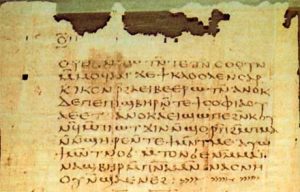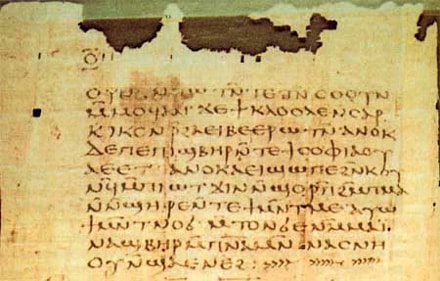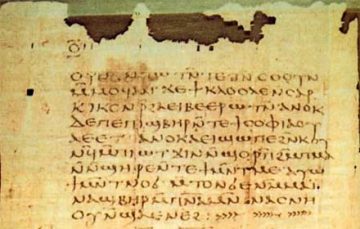 The Gospel of Thomas is an early Christian text that was found in an urn, in a cave, in the desert of Upper Egypt during WWII in 1945. Fragments of the text have been found in other places, but in 1945 the complete text, along with other texts were found in the Nag Hammadi region of Egypt.
The Gospel of Thomas is an early Christian text that was found in an urn, in a cave, in the desert of Upper Egypt during WWII in 1945. Fragments of the text have been found in other places, but in 1945 the complete text, along with other texts were found in the Nag Hammadi region of Egypt.
The records were written on papyrus and bound in leather. The language is Coptic, an ancient Egyptian language written with the Greek alphabet. The papyrus found in Nag Hammadi date back to the late 4th century. Scholarly analysis dates the content of the Thomas record to the 2nd century or even late 1st century.
Why were these records stored in an urn, in a cave, in a desert in the 4th century? Most likely because they didn’t make the cut for the first editions of the New Testament. The early Christian church was actually Christian churches. During the first four centuries incredible variety, diversity and plurality existed. The church that was established as the Master Story of Christianity came down from Peter and Paul, while the other churches were wiped out, or fled to the deserts.
The Gospel of Thomas consists of 114 logia, which are short, Koan-like are teachings of Jesus to his disciples. They are often in question and answer format. Much of the Gospel of Thomas overlaps with the canonical gospels and will be familiar to readers. However these teachings are more edgy and transformational–more Eastern—more mindful.
There are many reliable books exploring the history of the early church and the records found in Nag Hammadi. I would suggest works by James M. Robinson (Claremont), Elaine Pagels (Princeton), April DeConick (Rice), and Karen Leigh King (Harvard). The following website has the logia listed with several translations of each logia and commentary: http://www.earlychristianwritings.com/thomas/
Below are a two logia.
Logion 2 translation by Layton
Jesus said, “Let one who seeks not stop seeking until that person finds; and upon finding, the person will be disturbed; and being disturbed, will be astounded; and will reign over the entirety.”
Logion 3 translation by Blatz
Jesus said: If those who lead you say to you: See, the kingdom is in heaven, then the birds of the heaven will go before you; if they say to you: It is in the sea, then the fish will go before you. But the kingdom is within you, and it is outside of you. When you know yourselves, then you will be known, and you will know that you are the (children) of the living Father. But if you do not know yourselves, then you are in poverty, and you are poverty.
Discussion:
Are you familiar with the Gospel of Thomas? Would you like to see more logia in future posts?
The papyri can be viewed on-line or in-person at museums. What do you think about the physical existence of these records versus the Book of Mormon records?
Does Logion 2 speak to current ‘troubling’ information we find as we are seeking? Does Jesus instructions to not stop seeking encourage you to carry on, knowing that eventually you will have peace?
Logion 3: A bird’s kingdom is the sky. A fish’s kingdom is the sea. A human’s kingdom is within us and around us. What does it mean to truly know yourself? What are your thoughts on poverty of spirit? Can you tie this in to the Sermon on the Mount?




7 Responses
Thanks for this! I’ve heard a bit about the Gospel of Thomas in the past, but I’ve never looked closely at it. It’s very interesting to think about the varieties of Christianity that existed in the very early church, and interesting to think about why the Gospel of Thomas didn’t make the cut for the New Testament canon. I do like those two logia you mention — I’m someone who is attracted to seeking and seekers, and it’s neat to see Jesus promoting self-reflection.
I vaguely recall that the Gospel of Thomas does some interesting things with gender. Does it say that gender won’t exist in the next life? I can’t quite remember, but if you come across that in your readings, I’d love to know you thoughts on that.
I heard many years ago that there were many versions of the gospels which were not recognized by official Christianity, and that the Gospel of Thomas was one of them. But more than that, I don’t know. I find the Logion quoted above hard to understand. Are they meant to be cryptic? In parables, Jesus speaks so plainly, but here he does not. I wonder if these really are the voice of Jesus? I suppose we will never know.
I love hearing this extended version of “seek and ye shall find.” Once we find, things can still be complicated!
Thank you all for your comments.
The writings in Thomas are more like the Gospel of John than like Matthew, Mark or Luke. They are not ‘plain-speak’. I like to take them slow, one at a time and ponder one of them for several days and imagine various interpretations of it. I also get a lot from other people’s interpretations and insights. I had an important dream the week I first heard Logion 2 and that has sat with me since September. There is much to be gained from pondering the meaning of these and other scriptures.
The reason it didn’t make the New Testament cut is probably because the sayings are not straight forward. Supposedly the book of Revelation almost didn’t make the cut.
These saying discuss the Kingdom of God as being within each of us and not something to be sought only after death. They are transformative for our current life and perhaps that didn’t jive with the powers-that-be at the time.
Whether or not they were actually Jesus’ words we cannot know anymore than we know about the Jesus-sayings in the Bible. However Thomas is reportedly dated back to the late 1st century or early 2nd. That is the same time as the gospel of Mark. That’s as early as it gets.
These records were stored untouched from the 4th century until 1945.
The part of the story of the history of the Thomas records is that they still are in existence and can be viewed and translated from the original Coptic by anyone who dares try. All the interpretations I’ve seen are similar. Each translator has a different slant, but the overall message is the same, as far I have seen them.
As far as gender in the next life, I haven’t come across that yet. The message seems more about unity in this life. It is a non-dualistic message of coming to know yourself in relationship with God — at one with God and with all others.
I have not studied any of these non-New Testament gospels and I am intrigued. Lately I have been struck by just how much of the New Testament comes either directly or indirectly from Paul. I know I have always liked James the best of all the books of the NT other than the 4 gospels and now I understand better why. Paul was just one disciple and giving voice to primarily one disciple (or apostle) is going to result in a biased view. Perhaps this is one way the apostasy was introduced.
So, I’m very intrigued to hear from a variety of voices.
I agree that the whole of Christianity is too slanted toward Paul. I suspect it was because it was the Roman branch of Christianity that selected the books of the New Testament and Paul was Roman, so I suppose they liked the more Roman thinking of Paul over the Jewish writers. Then Martin Luther made things worse because he preferred Paul and thought James was dead wrong because he suggested that faith without works was dead, which was too much importance placed on works for Luther’s taste.
I would recommend reading the Gnostic gospels because of the perspective they can give us. From the perspective of the gospel that we inherited from the Romans, the Gnostics were kinda crazy. But it is exactly that which opened my eyes to the possibility that the Romans changed the teachings of Jesus their direction and the Egyptian branch of Christianity changed it their direction and the true teaching of Jesus might be somewhere in the middle. Some of the ways the Romans changed Christianity are even documented by the history of the Roman Catholic Church. Joseph Smith did not restore all of the things that we know the Romans changed, but only a few.
I love that you posed the question about the Book of Mormon vs. the physical evidence of these records. The fact that there is no physical evidence for the Book of Mormon is a huge red-flag for me. Since I was young it has always felt suspicious and convenient to have the angel take the gold plates back up to Heaven. I just recently learned that there are ancient texts/books/writings that did not make it into the New Testament. Among those are; The Essene Gospel of Peace, The Gospel of Mary, The Gospel of Thomas, The Odes of Solomon, Pistis Sophia, etc…just to name a few. I am floored that these teachings from Jesus have been withheld from us. It saddens me to know that the Feminine Divine has been left out of the Godhead. I believe Christian patriarchy has over stepped their place to erase our Heavenly Mother from the Bible. An all male Godhead makes no sense at all.